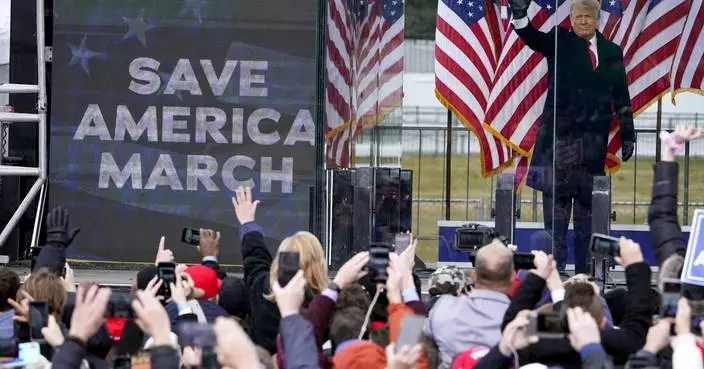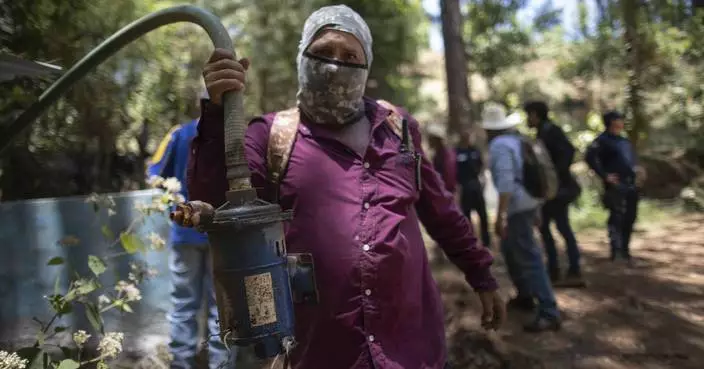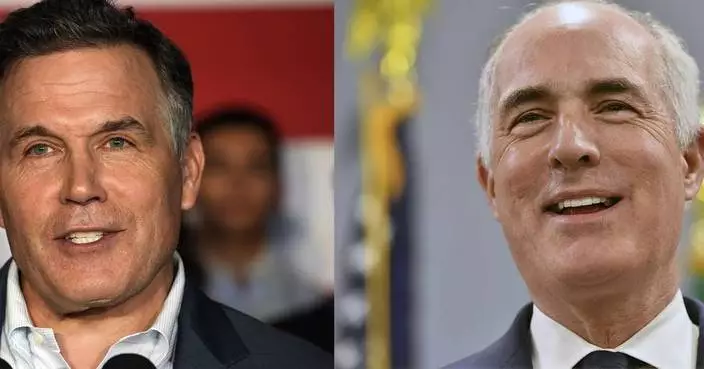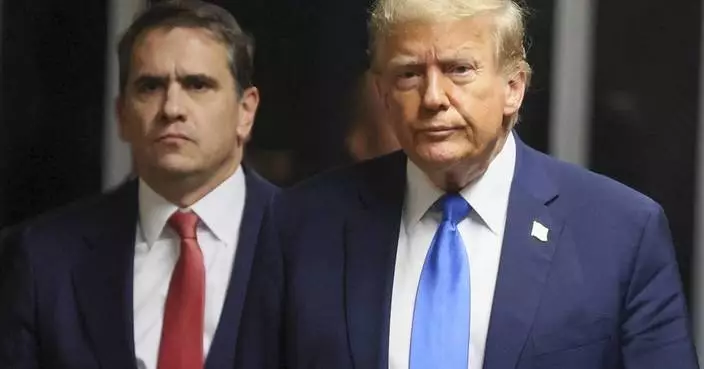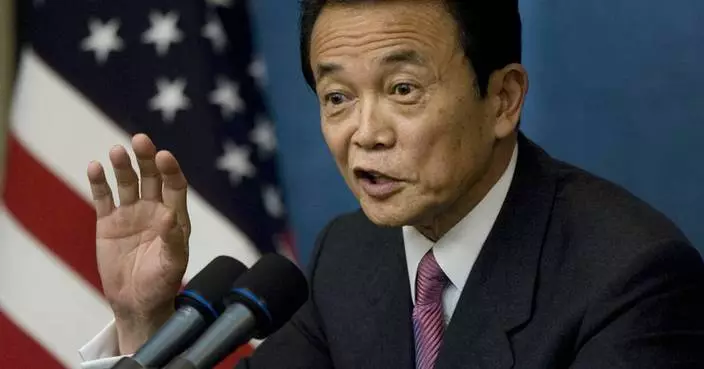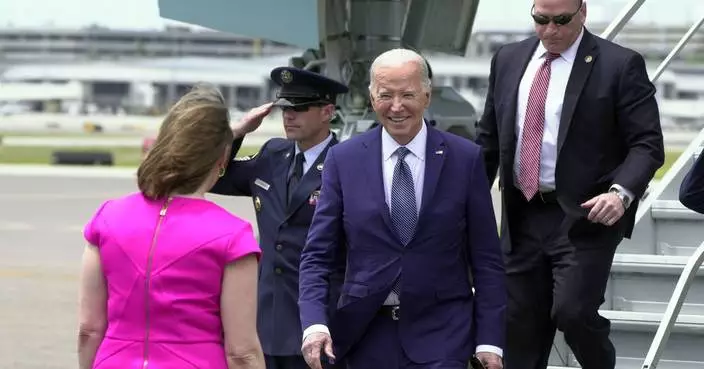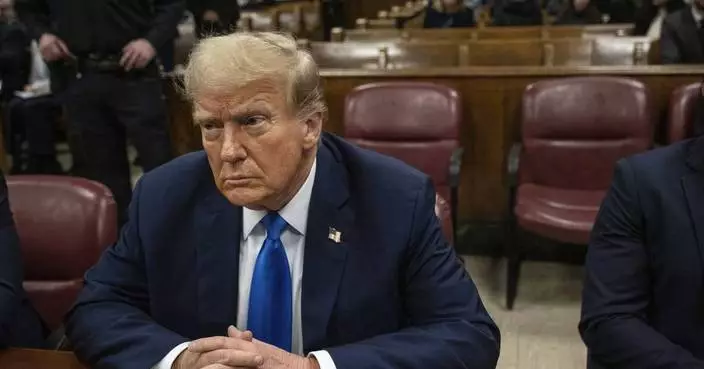Touring a small slice of Hurricane Maria's devastation, President Donald Trump congratulated Puerto Rico on Tuesday for escaping the higher death toll of "a real catastrophe like Katrina" and heaped praise on the relief efforts of his administration without mentioning the sharp criticism the federal response has drawn.
"Really nothing short of a miracle," he said of the recovery, an assessment at odds with the despair of many still struggling to find water and food outside the capital city in wide swaths of an island where only 5 percent of electricity customers have power back. The governor of Puerto Rico said late Tuesday that the official death toll has been increased to 34 from 16.
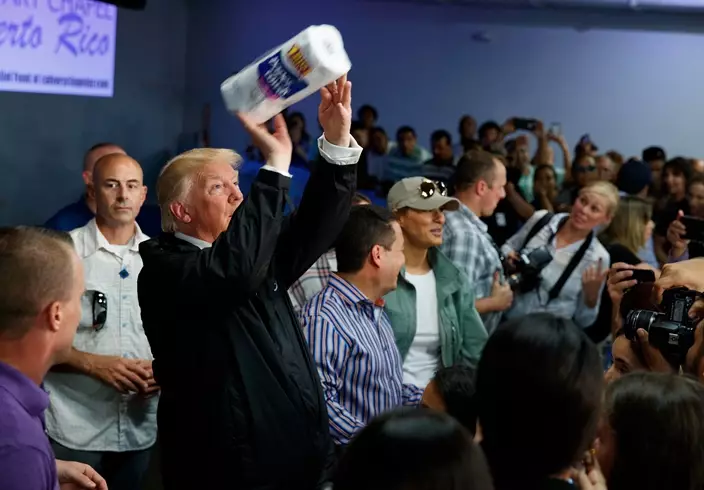
President Donald Trump tosses paper towels into a crowd as he hands out supplies at Calvary Chapel, Tuesday, Oct. 3, 2017, in Guaynabo, Puerto Rico. Trump is in Puerto Rico to survey hurricane damage. (AP Photo/Evan Vucci)
In the heart of San Juan, in fact, a few miles from the air base where Trump gave his thumbs-up report on progress, people stacked sewage-fouled clothes and mattresses outside houses and businesses lacking electricity nearly two weeks after the storm. "Nobody's come," said Ray Negron, 38, collecting debris in the Playita neighborhood.
Trump pledged an all-out effort to help the island while adding, somewhat lightly: "Now I hate to tell you, Puerto Rico, but you've thrown our budget a little out of whack because we've spent a lot of money on Puerto Rico. And that's fine. We've saved a lot of lives."
Known deaths from Maria in the U.S. territory stand at 34. But local officials caution that any accounting of death and destruction is far from complete as people suffer secondary effects from thirst, hunger and extreme heat without air conditioning. As for Katrina, as many as 1,800 people died in 2005 when levees protecting New Orleans broke, a toll in lives and property that took years to understand.
The visit offered fresh evidence of the unconventional path Trump has taken in responding to the one-two-three punch from hurricanes Harvey, Irma and Maria. His effusive praise for federal relief efforts has overshadowed his displays of empathy for those who are suffering. And in Puerto Rico, in particular, his criticism of local people for not doing more to help themselves has struck an off note during a time of crisis.
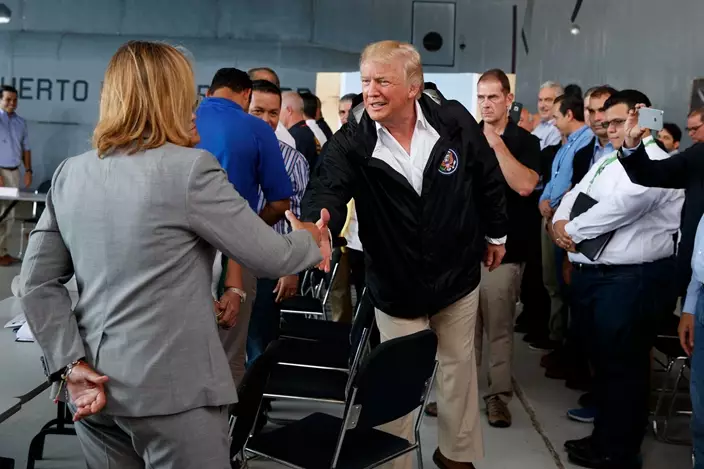
President Donald Trump shakes hands with San Juan Mayor Carmen Yulin Cruz during a briefing on hurricane recovery efforts with first responders at Luis Muniz Air National Guard Base, Tuesday, Oct. 3, 2017, in San Juan, Puerto Rico. (AP Photo/Evan Vucci)
Trump said his visit was "not about me" but then praised local officials for offering kind words about his administration's recovery effort and invited one to repeat the "nice things" she'd said earlier. Trump also singled out Gov. Ricardo Rossello for "giving us the highest praise."
"Every death is a horror," he said, "but if you look at a real catastrophe like Katrina and you look at the tremendous, hundreds of and hundreds and hundreds of people that died, and you look at what happened here with, really, a storm that was just totally overpowering, nobody has ever seen anything like this." He told local officials "you can be very proud of all your people, all of our people working together."
Trump's most prominent critic in Puerto Rico, San Juan Mayor Carmen Yulin Cruz, joined other officials at the air base for a briefing with him, shook the president's hand and said afterward she hoped he now understood the gravity of the situation. But his comment implying Maria was not a Katrina-level event left her unsure.
"Sometimes his style of communication gets in the way," she told CNN. "I would hope that the president of the United States stops spouting out comments that really hurt the people of Puerto Rico."
On a more positive note, Cruz said: "I saw a real connection between the reality and the White House staff. I think they finally understood."
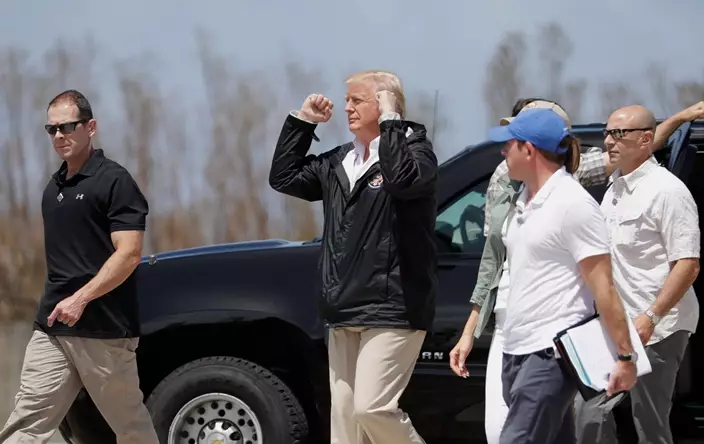
President Donald Trump gestures after arriving at the Luis Muñiz Air National Guard Base in San Juan, Puerto Rico, Tuesday, Oct. 3, 2017. Trump is visiting Puerto Rico in the wake of Hurricane Maria. (AP Photo/Evan Vucci)
Air Force One brought the president, first lady Melania Trump and aides to Puerto Rico for a tour stretching through the afternoon. At least parts of the itinerary seemed drawn to ensure a friendly reception: Trump visited with selected families waiting on their laws on a street lined with debris, including tree limbs and corrugated metal siding. Trump posed for photos, asked the residents what it was like during the storm and pledged his assistance.
"Thank you for being here, it's so good to see you," one man said in Spanish.
Up the road in the upscale Guaynabo neighborhood, one of the fastest to recover, around 200 people cheered Trump's visit to a local church being used to distribute supplies. Many crowded around him for cellphone photos as he handed out flashlights and tossed rolls of paper towels into the friendly crowd.
"There's a lot of love in this room, a lot of love," Trump said. "Great people."
Asked by the AP what he has to say to people still without power, food and water, he spoke of the generators brought to the island and said the electrical grid is being fixed.
"Again, the job that's been done here is really nothing short of a miracle," he said.
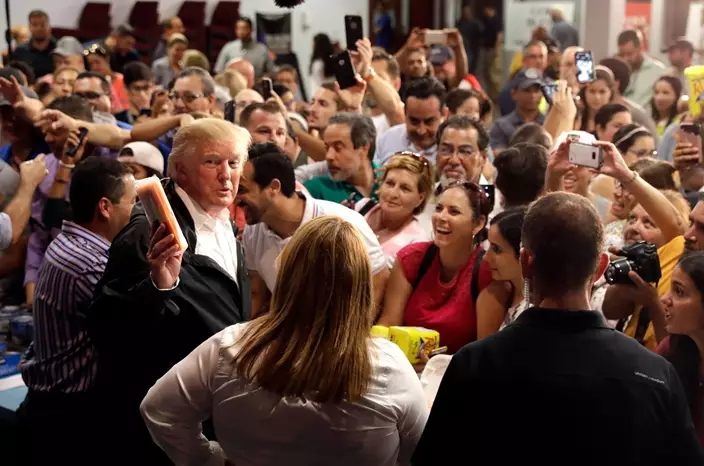
President Donald Trump hands out food to people effected by Hurricane Maria as he visits a disaster relief distribution center at Calgary Chapel in Guaynabo, Puerto Rico, Tuesday, Oct. 3, 2017. Trump is visiting Puerto Rico in the wake of Hurricane Maria.(AP Photo/Evan Vucci)
Earlier, on approach to the airport, Air Force One descended over a landscape marked by mangled palm trees, metal debris strewn near homes and patches of stripped trees, yet with less devastation evident than farther from San Juan.
For much of his tour, Trump remained focused primarily on drawing praise.
"I appreciate your support and I know you appreciate ours," Trump said. "Our country has really gone all out. It's not only dangerous, it's expensive. But I consider it a great honor."
Large-scale protests against Trump, talked about in advance, failed to materialize by early afternoon, with only a few knots of people gathering around San Juan.
As he headed out from the White House to visit the island, Trump told reporters "it's now acknowledged what a great job we've done."
The trip is Trump's fourth to areas battered by storms during an unusually violent hurricane season that has also seen parts of Texas, Florida, Louisiana and the U.S. Virgin Islands inundated by floodwaters and hit by high winds.
Trump's visit follows a weekend in which he had aggressively pushed back against critics, including Cruz. He had responded angrily on Twitter, deriding the "poor leadership ability by the Mayor of San Juan, and others in Puerto Rico, who are not able to get their workers to help."
"They want everything to be done for them when it should be a community effort," he added, scoffing at "politically motivated ingrates" who had criticized the federal work, and insisting that "tremendous progress" was being made.
Cruz had begged the administration to "make sure somebody is in charge that is up to the task of saving lives" and said federal inefficiency was killing people.
Trump and his wife also visited Navy and Marine Corps personnel on the flight deck of the USS Kearsarge, landing on the deck in Marine One.
On the flight back to Washington, Trump told reporters he'd heard no criticism while on the ground. "No, we only heard thank you's from the people of Puerto Rico," he said, adding, "I think it meant a lot to the people of Puerto Rico that I was there."
Even before the storm hit on Sept. 20, Puerto Rico was in dire condition thanks to a decade-long economic recession that had left its infrastructure, including the island's power lines, in a sorry state. Maria was the most powerful hurricane to hit the island in nearly a century and unleashed floods and mudslides that knocked out the island's entire electrical grid and telecommunications, along with many roads.
The Federal Emergency Management Agency said more than 12,000 federal officials are now on the ground on the island, and 45 percent of customers now have access to drinking water. Businesses are also beginning to re-open, with 70 percent of retail gas stations now up and running.
WASHINGTON (AP) — For Senate Republican leader Mitch McConnell and House Speaker Mike Johnson, the necessity of providing Ukraine with weapons and other aid as it fends off Russia's invasion is rooted in their earliest and most formative political memories.
McConnell, 82, tells the story of his father’s letters from Eastern Europe in 1945, at the end of World War II, when the foot soldier observed that the Russians were “going to be a big problem” before the communist takeover to come. Johnson, 30 years younger, came of age as the Cold War was ending.
As both men pushed their party this week to support a $95 billion aid package that sends support to Ukraine, as well as Israel, Taiwan and humanitarian missions, they labeled themselves “Reagan Republicans” an described the fight against Russian President Vladimir Putin in terms of U.S. strength and leadership. But the all-out effort to get the legislation through Congress left both of them grappling with an entirely new Republican Party shaped by former President Donald Trump.
While McConnell, R-Ky., and Johnson, R-La., took different approaches to handling Trump, the presumptive White House nominee in 2024, the struggle highlighted the fundamental battle within the GOP: Will conservatives continue their march toward Trump’s “America First” doctrine on foreign affairs or will they find the value in standing with America's allies? And is the GOP still the party of Ronald Reagan?
“I think we’re having an internal debate about that,” McConnell said in an interview with The Associated Press. “I’m a Reagan guy and I think today — at least on this episode — we turned the tables on the isolationists.”
Still, he acknowledged, “that doesn’t mean they’re going to go away forever.”
McConnell, in the twilight of his 18-year tenure as Republican leader, lauded a momentary victory Tuesday as a healthy showing of 31 Republicans voted for the foreign aid; that was nine more than had supported it in February. He said that was a trend in the right direction.
McConnell, who has been in the Senate since 1985, said passing the legislation was “one of the most important things I’ve ever dealt with where I had an impact."
But it wasn’t without cost.
He said last month he would step away from his job as leader next year after internal clashes over the money for Ukraine and the direction of the party.
For Johnson, just six months into his job as speaker, the political crosscurrents are even more difficult. He is clinging to his leadership post as right-wing Republicans threaten to oust him for putting the aid to Ukraine to a vote. While McConnell has embraced American leadership abroad his entire career, Johnson only recently gave complete support to the package.
Johnson has been careful not to portray passage as a triumph when a majority of his own House Republicans opposed the bill. He skipped a celebratory news conference afterward, describing it as “not a perfect piece of legislation” in brief remarks.
But he also borrowed terms popularized by Reagan, saying aggression from Russia, China and Iran “threatens the free world and it demands American leadership.”
“If we turn our backs right now, the consequences could be devastating,” he said.
Hard-line conservatives, including some who are threatening a snap vote on his leadership, are irate, saying the aid was vastly out of line with what Republican voters want. They condemned both Johnson and McConnell for supporting it.
“House Republican leadership sold out Americans and passed a bill that sends $95 billion to other countries,” said Republican Sen. Tommy Tuberville of Alabama, who opposed the bill. He said the legislation "undermines America's interests abroad and paves our nation's path to bankruptcy.”
Johnson has been lauded by much of Washington for doing what he called “the right thing" at a perilous moment for himself and the world.
“He is fundamentally an honorable person,” said Senate Majority Leader Chuck Schumer, D-N.Y., who brokered the negotiations and spent hours on the phone and in meetings with Johnson, McConnell and the White House.
Sen. Mitt Romney, R-Utah, said Johnson and McConnell “both showed great resolve and backbone and true leadership at a time it was desperately needed.”
When McConnell began negotiations over President Joe Biden's initial aid request last year, he quickly set the terms for a deal. He and Schumer agreed to pair any aid for Ukraine with help for Israel, Schumer said, and McConnell demanded policy changes at the U.S. border with Mexico.
On McConnell's mind, he said, was that Trump was “unenthusiastic” about providing more aid to Kyiv. Yet McConnell, whose office displays a portrait of every Republican president since Reagan with the exception of Trump, had a virtually nonexistent relationship with the man he often refers to not by name, but simply as “the former president.”
Still, Trump would prove to hold powerful sway. When a deal on border security neared completion after months of work, Trump eviscerated the proposal as insufficient and a “gift” to Biden's reelection. Conservatives, including Johnson, rejected it out of hand.
With the border deal dead, McConnell pushed ahead with Schumer on the foreign aid, with the border policies stripped out, solidifying their unusual alliance. The Senate leaders met weekly throughout the negotiation.
“We disagreed on a whole lot, but we really stuck together,” Schumer said.
“We just persisted. We could not give up on this."
Meanwhile, a small group of GOP senators began working on an idea they thought could give Johnson some political wiggle room. Sens. Lindsey Graham of South Carolina, Kevin Cramer of North Dakota and Markwayne Mullin of Oklahoma took an idea that Trump had raised — structuring the aid to Ukraine as a loan — and tried to make it reality.
Through a series of phone calls with Trump, several House members, as well as the speaker, they worked to structure roughly $9 billion in economic aid for Ukraine as forgivable loans — just as it was in the final package.
“Our approach this time was to make sure that the politics were set, meaning that President Trump is on board,” Mullin said.
The conversations culminated in Johnson making a quick jaunt to Florida, where he stood side by side with Trump at his Florida club just days before moving ahead with the Ukraine legislation in the House.
It was all enough, with Democratic help, to get the bill across the finish line. The legislation, which Biden signed into law on Wednesday, included some revisions from the Senate bill, including the loan structure and a provision to seize frozen Russian central bank assets to rebuild Ukraine. Nine GOP senators who had opposed the first version of the bill swung to “yes” largely because of the changes Johnson had made.
The result was a strong showing for the foreign aid in the Senate, even though the decision could prove costly for Johnson.
What comes next on Ukraine is anyone's guess.
While the $61 billion for Ukraine in the package is expected to help the country withstand Moscow's offensive this year, more assistance will surely be needed. Republicans, exhausted after a grueling fight, largely shrugged off questions about the future.
“This one wasn’t easy,” Mullin said.
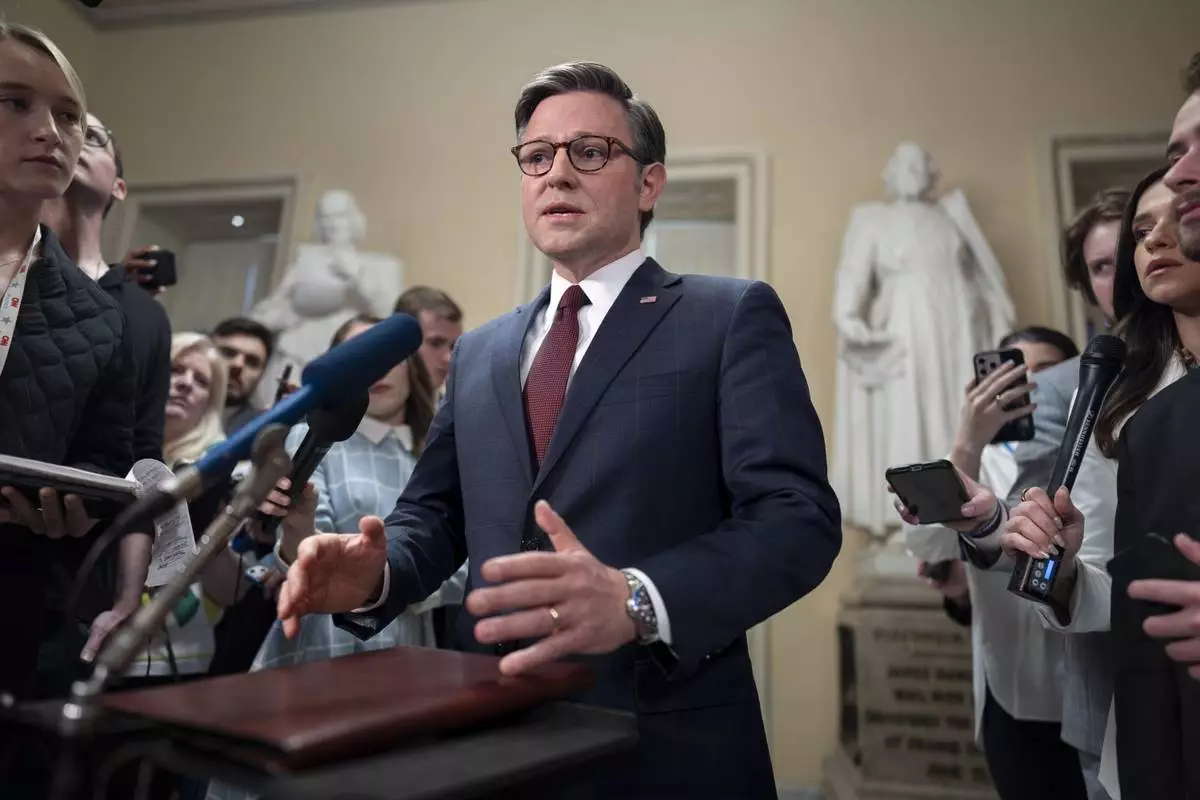
Speaker of the House Mike Johnson, R-La., talks to reporters just after the House voted to approve $95 billion in foreign aid for Ukraine, Israel and other U.S. allies, at the Capitol in Washington, Saturday, April 20, 2024. (AP Photo/J. Scott Applewhite)
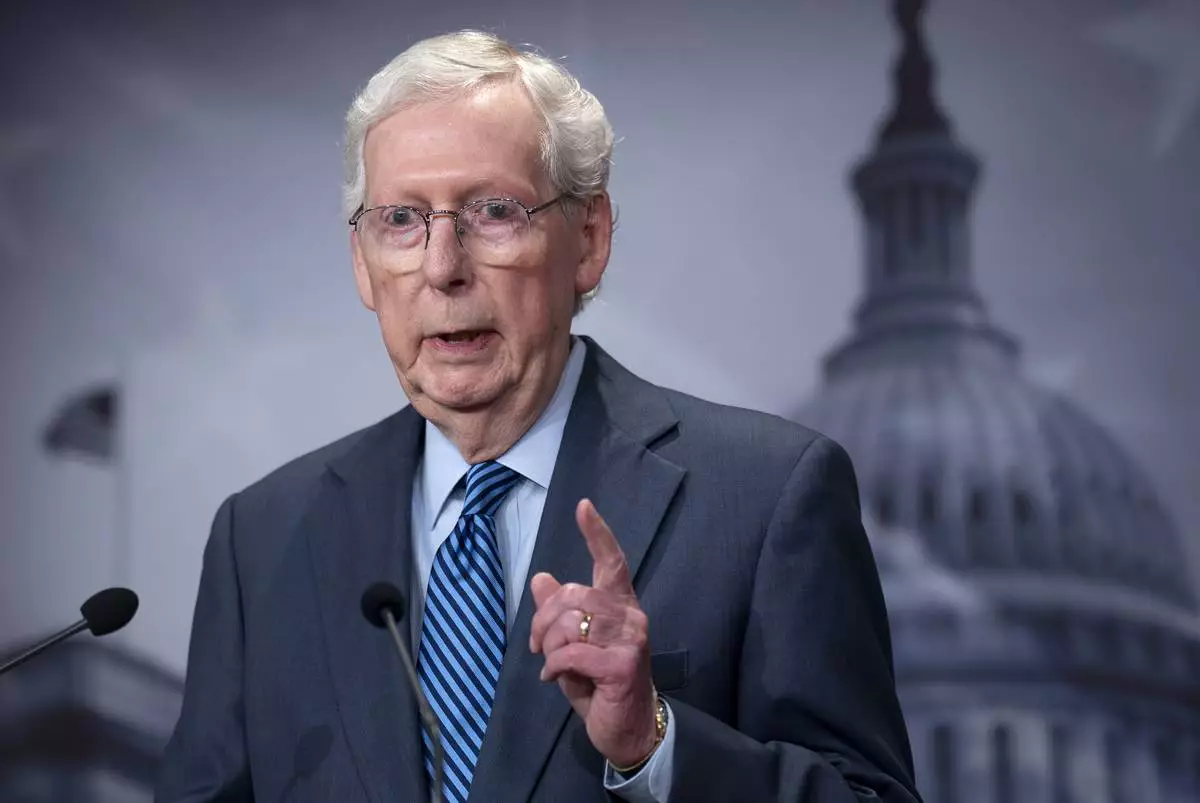
Senate Minority Leader Mitch McConnell, R-Ky., praises support for Ukraine as the Senate is on track to pass $95 billion in war aid to Ukraine, Israel and Taiwan, at the Capitol in Washington, Tuesday, April 23, 2024. (AP Photo/J. Scott Applewhite)
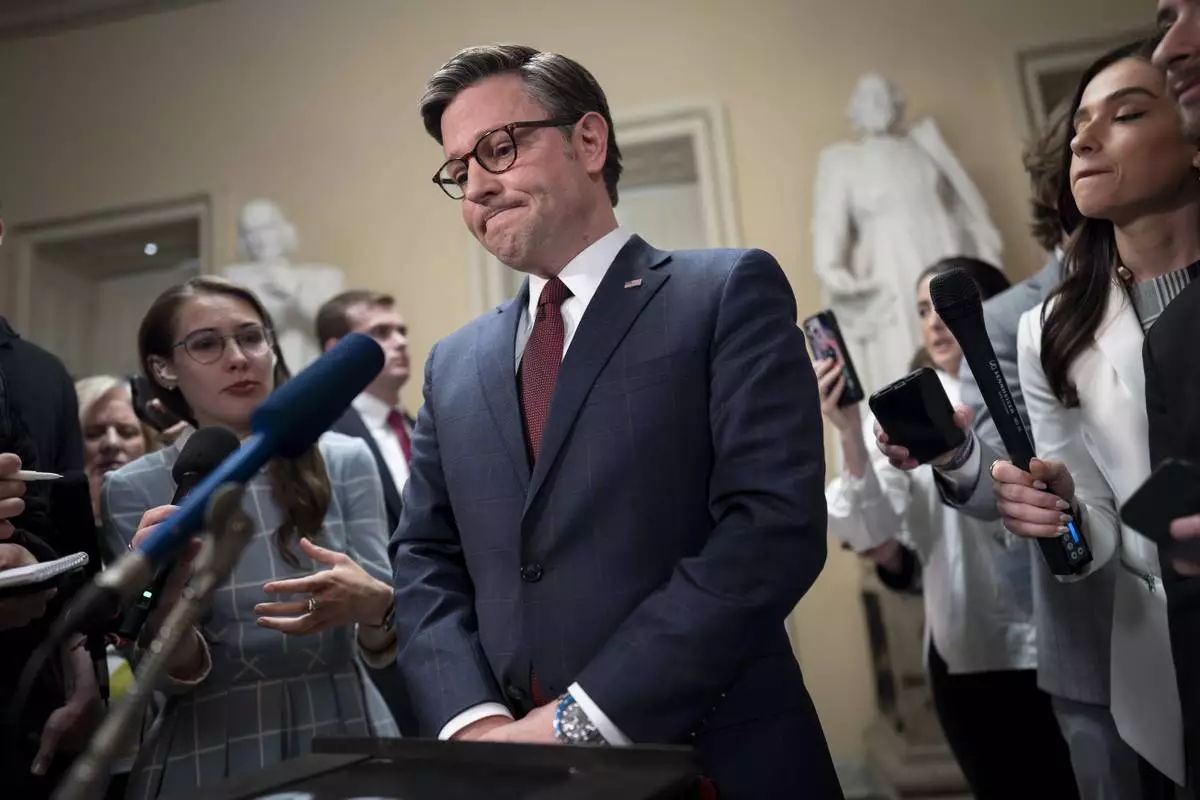
Speaker of the House Mike Johnson, R-La., talks to reporters just after the House voted to approve $95 billion in foreign aid for Ukraine, Israel and other U.S. allies, at the Capitol in Washington, Saturday, April 20, 2024. (AP Photo/J. Scott Applewhite)
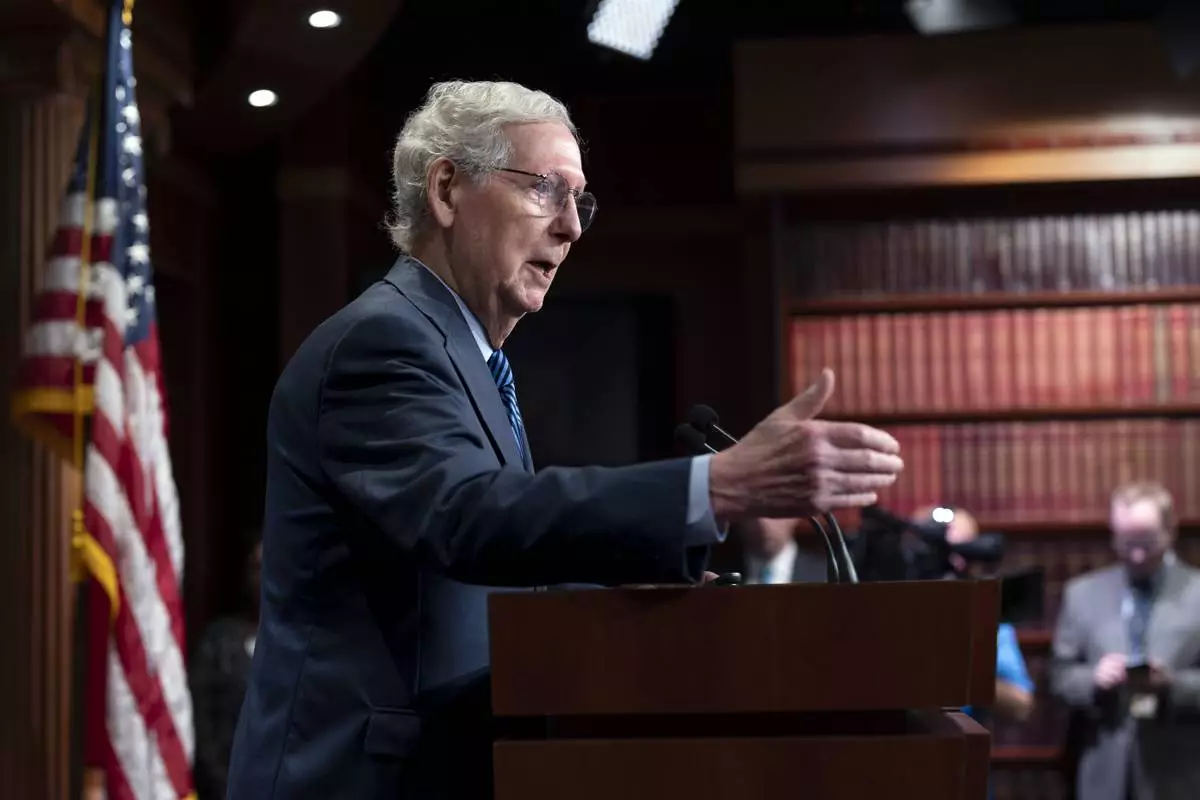
Senate Minority Leader Mitch McConnell, R-Ky., praises support for Ukraine as the Senate is on track to pass $95 billion in war aid to Ukraine, Israel and Taiwan, at the Capitol in Washington, Tuesday, April 23, 2024. (AP Photo/J. Scott Applewhite)
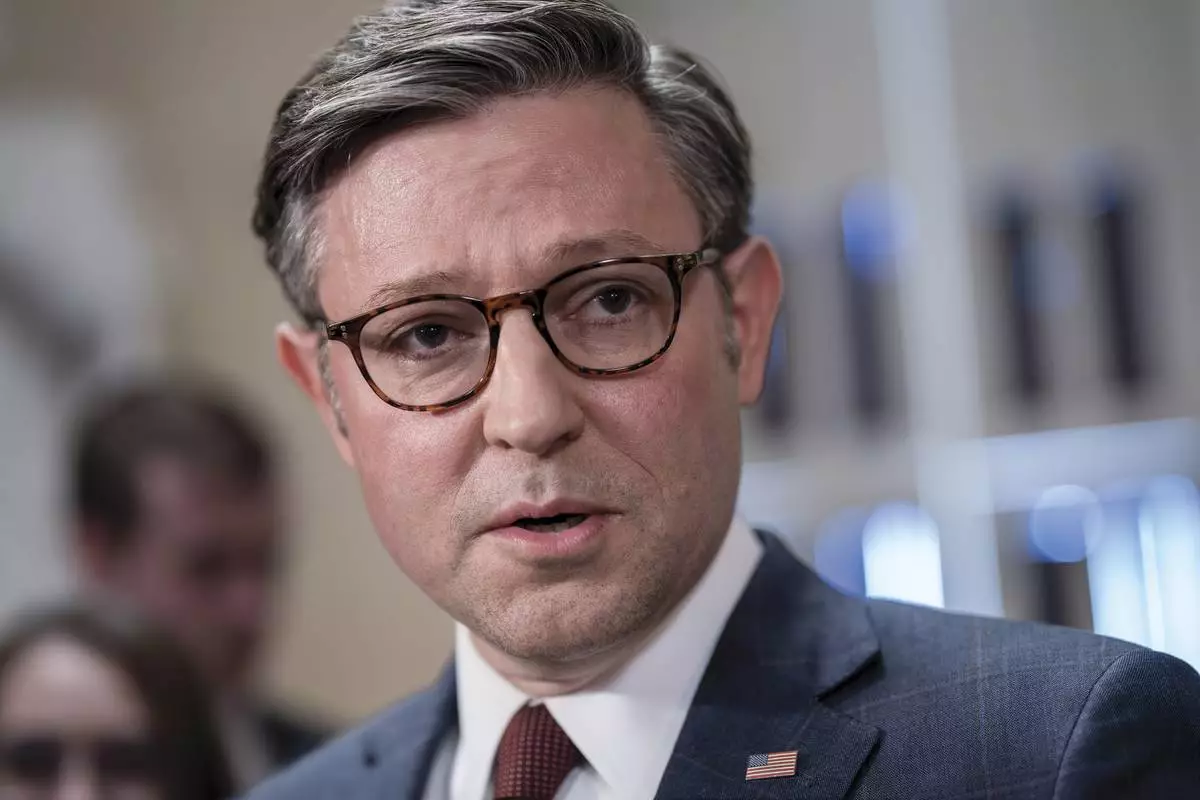
Speaker of the House Mike Johnson, R-La., talks to reporters just after the House voted to approve $95 billion in foreign aid for Ukraine, Israel and other U.S. allies, at the Capitol in Washington, Saturday, April 20, 2024. (AP Photo/J. Scott Applewhite)
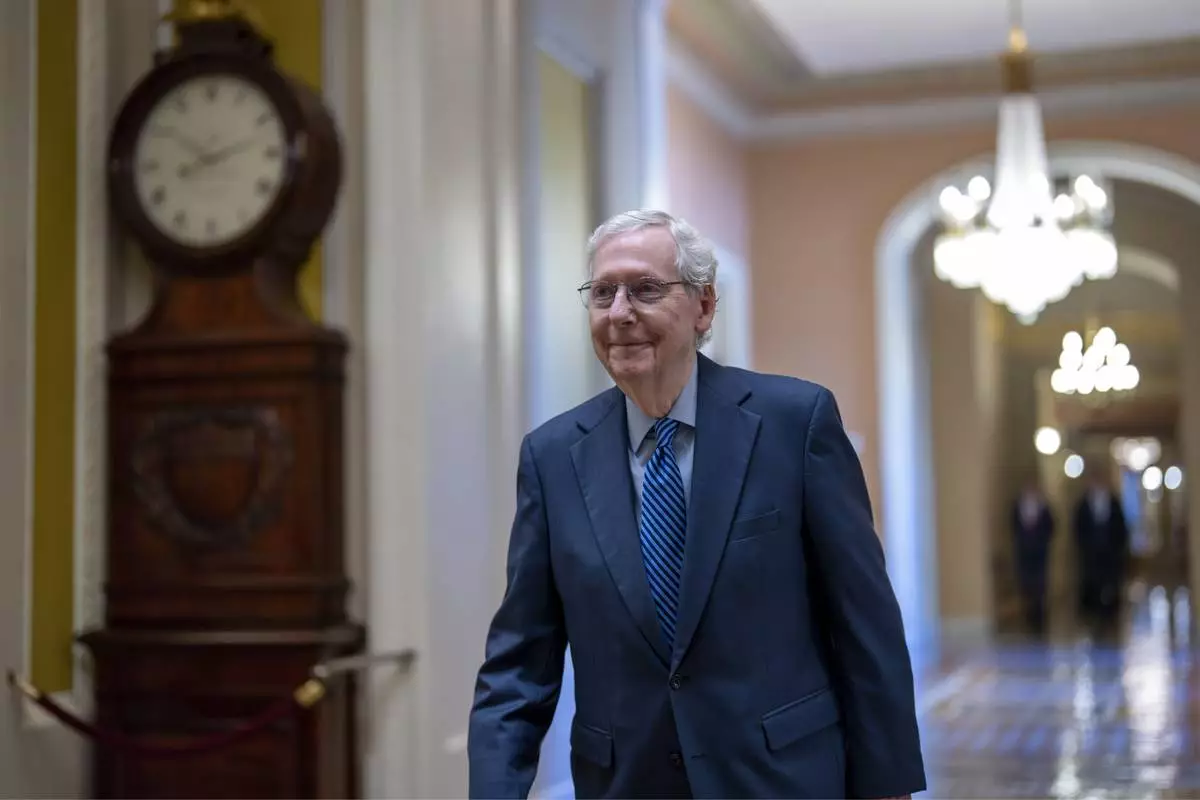
Senate Minority Leader Mitch McConnell, R-Ky., walks to the chamber as the Senate prepares to advance the $95 billion aid package for Ukraine, Israel and Taiwan passed by the House, at the Capitol in Washington, Tuesday, April 23, 2024. (AP Photo/J. Scott Applewhite)













